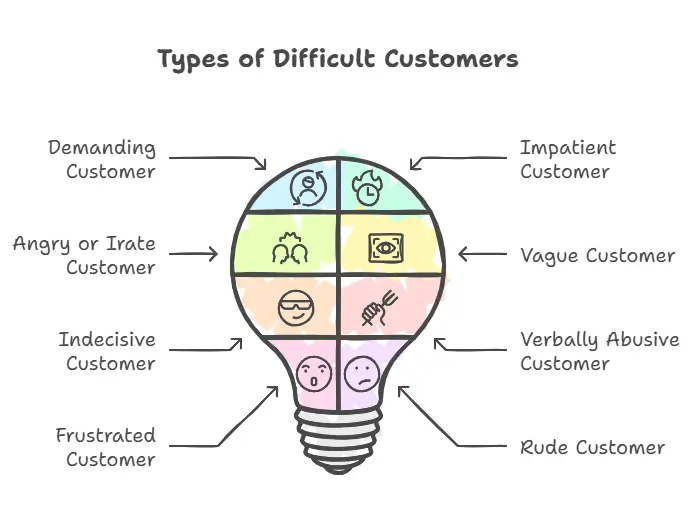Every business owner or customer support team has faced this question: How do you handle difficult customers without losing your cool? Whether it’s a demanding customer, an irate customer, or someone simply frustrated, these interactions can feel like a tightrope walk.
The good news? Handling difficult customers isn’t just about resolving issues—it’s a chance to turn a negative experience into stronger customer relationships. In this post, we’ll share 8 proven tips to help you manage angry or challenging customers, build customer loyalty, and deliver excellent customer service, no matter how tough the situation.
We’ll dive into:
- Techniques like active listening and positive language to de-escalate tense situations.
- Insights on understanding different types of difficult customers.
- How to handle challenging situations while keeping your team motivated.
What Are Difficult Customers?
Difficult customers are individuals who present challenges during interactions with a business or its representatives. These challenges can stem from their behavior, communication style, or dissatisfaction with a product or service. While their frustrations may sometimes be justified, the way they express their concerns often makes the interaction harder to navigate.
Common Traits of Difficult Customers:
- Emotional Responses: Anger, impatience, frustration, or disappointment.
- Unrealistic Expectations: Demands that exceed what the business can provide.
- Negative Communication: Rudeness, lack of clarity, or even abusive language.
- High Stakes: Their concern may feel urgent or critical to them, even if it seems minor to the business.
Types of Difficult Customers

Understanding the various types of difficult customers is the first step toward managing them effectively. Each type requires a unique approach to ensure a positive resolution. Here are some common examples:
- The Demanding Customer
- The Impatient Customer
- The Angry or Irate Customer
- The Vague Customer
- The Indecisive Customer
- The Verbally Abusive Customer
- The Frustrated Customer
- The Rude Customer
8 Tips For Deal with difficult customers
1. Practice Active Listening
When dealing with difficult customers, one of the most powerful tools in your arsenal is active listening. Frustrated customers want to feel heard and understood, so it’s essential to focus on their words and body language without interrupting.
Start by:
📌 Remaining calm and taking a deep breath before responding. This helps manage your emotions.
📌 Showing that you’re engaged through cues like nodding or maintaining eye contact.
📌 Repeating their concerns to ensure you have a complete understanding of the issue.
For example, when a demanding customer vents about a delayed delivery, you might say:
“I understand you’re upset about your order being late. Let me confirm the details so we can resolve this as quickly as possible.”
This approach not only makes them feel heard but also sets the tone for a constructive resolution process. Plus, practicing active listening skills fosters stronger customer relationships and improves the overall customerexperience.
2. Stay Calm and Professional
When facing an angry customer or a verbally abusive individual, staying calm can be challenging but is absolutely necessary. Reacting emotionally only escalates the tension, so focus on maintaining a level-headed approach.
Here’s how you can manage these situations:
📌 Speak slowly and maintain a steady tone to project confidence and composure.
📌 Use positive language like, “Let’s find a solution,” instead of focusing on what can’t be done.
📌 Avoid negative language that might fuel the customer’s anger. For instance, replace “I can’t help you” with “Let’s see what I can do to assist you.”
Imagine handling an extremely angry customer who feels their customer’s time is being wasted. Instead of pointing out delays, focus on the steps you’re taking for a satisfactory resolution:
“I understand how valuable your time is. Let’s work together to get this sorted for you right away.”
By maintaining professionalism, you not only de-escalate the situation but also demonstrate your commitment to excellent customer service.
3. Understand the Customer’s Problem
Sometimes, difficult customers are simply looking for someone to empathize with their frustrations. This is where stepping into the customer’s shoes becomes critical. Take the time to understand their perspective and show genuine concern.
Key steps include:
📌 Asking open-ended questions to gather all the context behind the issue.
📌 Paraphrasing the customer’s complaints to ensure they feel understood.
📌 Acknowledging their emotions with statements like, “I can see why this would be upsetting.”
For instance, an indecisive customer might keep changing their mind about a product. Instead of getting impatient, help them explore their options with clear guidance and reassurance. This approach minimizes tension and turns an otherwise tricky interaction into a positive customer experience.
Pro Tip: Acknowledging the issue doesn’t mean taking the blame—it means validating the customer’s feelings and working toward a solution.
4. Adapt to Different Types of Difficult Customers
Not all challenging customers are the same. Understanding the specific type of difficult customer you’re dealing with can help you adjust your approach for the best outcome.
Here’s how to handle some common scenarios:
📌 The Demanding Customer: Focus on clear communication and firm boundaries while remaining courteous. For example, clarify what’s feasible within your company policy without over-promising.
📌 The Impatient Customer: Acknowledge their need for urgency and assure them their issue is being prioritized.
📌 The Vague Customer: Ask specific questions to uncover the root of their concern. Try phrases like, “Could you tell me more about what you need?”
📌 The Verbally Abusive Customer: Set boundaries respectfully. Say something like, “I’m here to help, but I need us to communicate respectfully to move forward.”
By tailoring your approach to the situation, you can keep interactions productive and guide upset customers toward a resolution. Recognizing these dynamics is a key part of effective customer relationship management.
5. De-Escalate Tense Situations Quickly
When customers are irate, your first goal is to calm things down. The longer tensions remain high, the harder it becomes to reach a resolution.
Here are de-escalation techniques to use with angry customers:
📌 Stay empathetic: Validate their feelings by saying, “I understand this is frustrating.”
📌 Focus on solutions: Shift the conversation to resolving the problem. For instance, “Let’s see how we can fix this for you today.”
📌 Use your tone, body language, and words to reduce conflict. Keep your hands steady, maintain eye contact, and show patience.
If a customer’s anger escalates, guide them back to the problem with gentle redirects. For example:
“I understand you’re upset, and I want to help. Let’s revisit the details so we can sort this out together.”
This approach not only resolves the immediate issue but also prevents negative reviews from piling up and harming your reputation.
6. Offer Clear Communication Channels
Clear and consistent communication is crucial in challenging situations. Customers want to know where to reach you and how their concerns are being handled.
Best practices include:
📌 Offering self-service options for simple issues, freeing up your team for more complex cases.
📌 Clearly explaining the resolution process and providing realistic timelines.
📌 Following up on unresolved issues to show customers they matter.
For example, if a frustrated customer raises a complaint through email, follow up with a phone call or message to confirm the issue has been resolved. This proactive approach builds trust and encourages customer loyalty.
Pro Tip: Providing multiple communication channels ensures customers feel supported, whether they’re contacting you via phone, email, or live chat.
7. Empower Your Support Team
A well-trained customer support team is your frontline defense in handling difficult customers effectively. Empowering team members with the right tools and training ensures they can confidently manage even the toughest scenarios.
Here’s what works:
📌 Role-Playing Exercises: Simulate real-life situations, like dealing with a demanding customer scenario or calming an irate customer, to build confidence.
📌 Teach Active Listening Skills: Help team members practice techniques like paraphrasing and focusing on the customer’s problem to improve customer interactions.
📌 Policy Awareness: Ensure your team knows company policies inside out, so they can offer resolutions that align with your business goals.
Support teams equipped with these skills can turn unhappy customers into loyal customers, reinforcing your brand’s reputation for excellent customer service.
8. Turn Negative Experiences Into Opportunities
Every interaction, even with rude customers, is a chance to strengthen relationships. The key is to focus on learning from these moments to improve your customer experience strategy.
Steps to make the most of these opportunities:
📌 Ask for Feedback: Invite feedback after resolving an issue. For instance, “How can we improve your experience next time?”
📌 Analyze Patterns: Track common issues raised in customer complaints to prevent future occurrences.
📌 Celebrate Wins: Share stories of team members who successfully handled challenging customers to inspire others.
Even a verbally abusive customer can become an advocate for your brand if they feel their concerns were handled with care and professionalism.
Conclusion: Build Stronger Customer Relationships
Handling difficult customers isn’t just about solving problems; it’s about showing your dedication to every interaction. Whether you’re helping an indecisive customer find clarity, calming an impatient customer, or addressing a vague customer’s concerns, the goal is always the same—turn a tough moment into an opportunity to build stronger customer relationships.
By combining skills like active listening, clear communication, and de-escalation techniques, you’re not only improving individual interactions but also setting the stage for long-term customer satisfaction and customer loyalty.
With the right mindset and tools, even the toughest customers can become your biggest advocates.
FAQs
What is the best way to handle an angry customer?
The best way is to remain calm, practice active listening, and use positive language to de-escalate the situation. Focus on understanding their concerns and providing a solution quickly.
How do you deal with a verbally abusive customer?
Stay professional, set boundaries respectfully, and avoid escalating the situation. Redirect the conversation to the issue at hand and offer a resolution aligned with your company policy.
Why is active listening important in customer service?
It helps customers feel heard, builds trust, and leads to faster resolutions. Plus, it’s a cornerstone of excellent customer service.
What are common types of difficult customers?
These include demanding customers, indecisive customers, impatient customers, and verbally abusive customers. Each requires a tailored approach to ensure a positive outcome.


